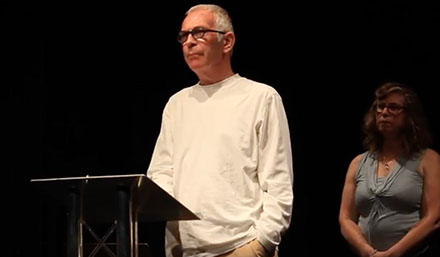
STUART BUTLER
Entertaining, Informing and Educating

It’s all very well putting on a show about Chartism for an informed audience, but what are the implications for putting on a show about Chartism to an audience that might well contain many people who have scant knowledge of those turbulent times? An audience that might well contain school age young people …
Our show about George Shell and the Newport Rising required little introduction in Newport Cathedral - but we realised that we had to quickly contextualise the show before we launched into our performance elsewhere. I thought readers might be interested in how we went about this for two shows within the weekend Stroud Theatre Festival.
The show is a performance presentation for three voices, rather than a play: the three voices feature a narrator, George Shell, of course, and the foregrounded voice of his lover and mentor, Charlotte-Alice Bingham. The conceit within the presentation deliberately foregrounds a woman’s voice and role …
Here is how I seek to introduce the subject of Chartism to a potentially uninformed audience, with a little bit of Show and Tell …
‘Good morning/afternoon,
You are, as the teachers say, a mixed-ability audience! Some of you will know the history of Chartism inside out, while some of you, understandably, may have little idea. If you weren't taught it at school …then …
(I shrug my shoulders and look quizzical)...
I have here in my hand a bottle of Stroud Brewery porter: ‘Chartist Porter’. Why so?
Chartism was a working class movement of the 1830s and 40s that wanted to establish democracy in the country, at a time when only the aristocracy and middle class men had the vote.
It was based upon 6 points: the secret ballot so there could be no intimidation; payment of MPs so that working people could stand; same-size constituencies to prevent the old rural aristocracy lording it over the new industrial towns; ending the ownership of property rule to become an MP, so that working people could stand; votes for all men over 21 (there were Chartist groups in favour of votes for women even back then, however); annual parliaments so that governments would keep their promises.
All but one of these is now the law, of course, but you could easily end up in prison in Chartist times for supporting these ideas ... lose your freedom, your job and home for wanting a democratic government ...
It's time to remember these freedom-fighters, and rescue them from what EP Thompson called, 'the enormous condescension of posterity'.
And so this show - our counter-heritage rescuing of two special working people from the enormous condescension of posterity: George Shell of Pontypool and Charlotte-Alice Bingham of Stroud.
This performance was commissioned by the Newport based charitable trust, Our Chartist Heritage, to commemorate the 1839 Newport Rising, in general, and the death of George Shell, in particular. Parts might be repeated, again, on the anniversary of the Rising next November, when we might perform by candle light in the graveyard of St Woolos Cathedral in Newport.
It was there that the dead insurrectionaries were secretly buried at night by the army to prevent any public displays of grief with consequent martyrdom. So circumspect was this military procedure, that all the horses' hooves were muffled...
Our piece opens with the names of those charged and sentenced, those who were killed, and their list of crimes back in that November day in 1839, when the ruling class viewed the word 'democracy' as a pejorative.’
I then wave Thomas Cooper’s Purgatory of Suicides in the air – ‘This book was presented to me by Pat Drewett in Newport. It is a poem of great length, sense and sensibility, which was written whilst the author – a Chartist – was incarcerated in prison. Thanks to Professor Steve Poole of UWE for reminding me of the following penned by Cooper:
“We do not write history like the glorious old Greeks, or the memory of such a hero would not be lost … May not a noble be found in November 2039, to commemorate Shell’s death at Newport with equal earnestness?”
It is not yet 2039, only 2018, but here follows our tribute to George Shell. We may not be noble, but we are earnest.
We now commemorate the death of George Shell.’
See Stroud performance









